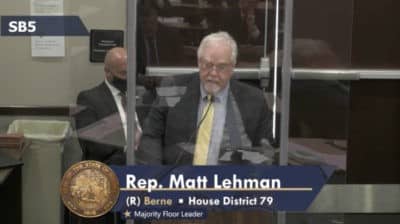
UPDATE: The Indiana General Assembly will reconvene Monday and may vote on overrides of two recent vetoes by Gov. Eric Holcomb.
Holcomb recently vetoed Senate Bill 5, which allows local elected officials to overturn the emergency orders of local health departments, and Senate Bill 303, which requires additional labeling on E-15 gasoline.
Sen. Chris Garten, R-Charlestown and author of Senate Bill 5, said he will discuss next steps with other legislators.
“When unelected officials are empowered to such a level as to limit religious liberty, shutter houses of worship, choose which businesses may operate and which must close, and impose fines on Hoosiers for living as free men and women, there must be a structural check and balance in place,” he said in the statement.
Co-sponsor of the bill Rep. Ed Clere, R-New Albany, expressed his disappointment in the decision by Holcomb to veto SB 5.
“Those discussions are ongoing, and leadership is trying to get a sense of where members are on a potential veto override,” Clere said.
***
EARLIER: Legislators are waiting on the governor to take action on Senate Bill 5, a bill to require approval for Indiana counties before implementing their own health mandates, impacting how the state handles the ongoing pandemic.
At the moment, health officials have the power to change mandates as they see fit. However, SB 5, authored by Sen. Chris Garten, R-Charlestown, and sponsored in the House by Rep. Matt Lehman (above), would require local health officials to get permission from elected officials, such as a mayor or county council, before applying the mandates to the community.
In Indiana, Gov. Eric Holcomb lifted COVID-19 mask mandates on April 6, but counties can still follow their own local mandates. Holcomb’s executive order says that government officials cannot follow guidelines less restrictive than those declared in the state but they can be more restrictive—like Marion County, which still requires masks.
SB 5 is the only bill passed by both chambers that still needs to be decided on by Holcomb.
According to The Indianapolis Star, Garten views the bill as a pro-local control bill.
“This language is not a knee-jerk reaction or a combative response to any enforcement action,” Garten said in the article. “Senate Bill 5 simply creates a structural check and balance on a position that has unparalleled authority under these emergency orders.”
However, the Indiana Public Health Association (IPHA) has spoken about the negative impact SB 5 will make because health restrictions currently in place will no longer be valid and will have to be lifted.
The main worries of health officials within the Indiana State Association of County and City Health Officials and the IPHA is leaving the decision concerning safety mandates to elected officials, “most of whom lack the expertise needed to properly engage in unusually complex public health subject and regulatory matters,” said the statement.
Dr. David Welsh of the IPHA is worried about the time it will take for elected officials to look over the petition to change health mandates in the county.
“Say there’s a public health issue at a business and they’re ordered to stop doing whatever the problem is and [the business] decide to appeal, well, that appeal can take a week or two for them to respond,” Welsh said. “So you might have literally months of something going on that could be putting the public at risk.”
Holcomb didn’t comment on the delay. He has until Wednesday to take action on the bill; if he doesn’t, the bill will automatically become a law, effective immediately.
Carolina Puga Mendoza is a reporter for TheStatehouseFile.com, a news website powered by Franklin College journalism students.